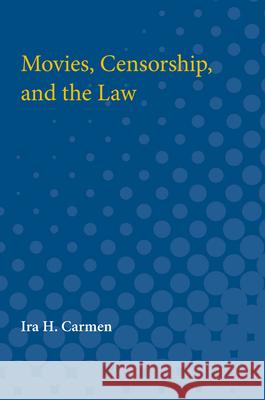Movies, Censorship, and the Law » książka
Movies, Censorship, and the Law
ISBN-13: 9780472750603 / Angielski / Miękka / 1966 / 350 str.
Who decides what movies we should see? In some of the nation's largest cities motion pictures are screened by review boards meeting in secret. Their files are seldom open to inspection, and they often wield a nearly absolute power over what the public is shown. This is the story of motion-picture censorship in America. It begins in 1915 when the Supreme Court denied freedom of the press to movies. In a fast-moving account of court cases and behind-the-scenes skirmishes, Ira Carmen follows the history of movie censorship to the present day. He shows how very recent court decisions reflect new thinking on censorship and the nature of obscenity. Today, forty-seven states and countless cities and towns have obscenity laws on their statute books. Are the censors stout guardians of the public morality . . . or witch-hunters? In a series of dramatic interviews with film censors in major cities, Carmen captures the flavor of the struggle between censor and exhibitor. The interviews reveal how censors think--what kinds of films they suppress and for what reasons, how they feel about foreign films as opposed to American, how they are influenced by court decisions, and how well they abide by those decisions. This pioneering book reveals what effect court decisions really have at the grassroots level. It examines the role of the constitution in the censorship debate and asks how effective the American political and judicial systems have been in coping with the problem. Finally, it offers a challenging analysis of what kind of censorship, if any, is needed in a free society.











